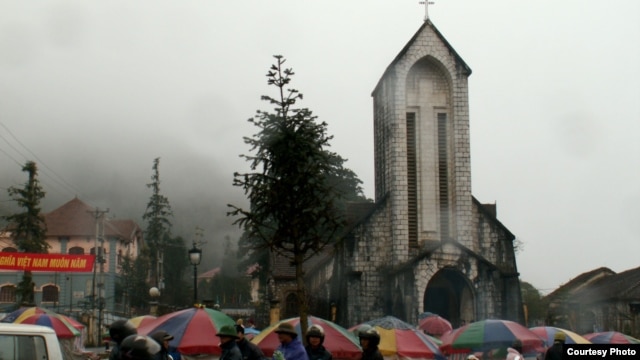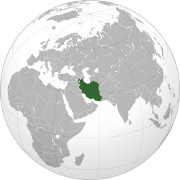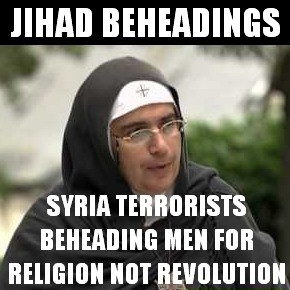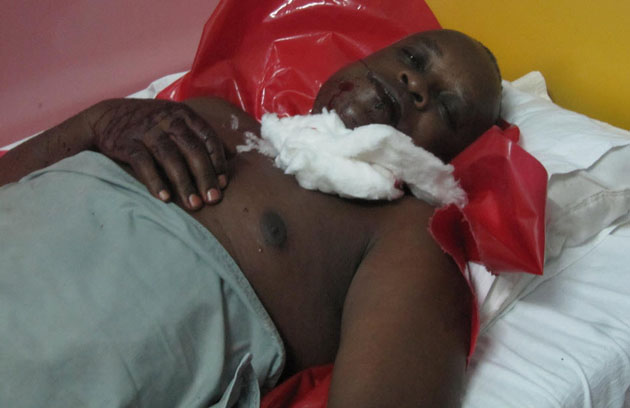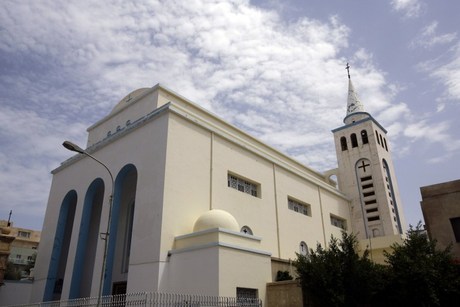Sharing of faith, even challenging censor by speaking out on persecution
 |
A priest holds services at a crowded
house church in Xining, Qinghai Province.
(Getty Images) |
London, Dec. 31 (World Watch Monitor) — Chinese Christians are sharing their faith on Weibo, China’s giant, state-regulated, social network – and some are beginning to challenge the censor by speaking out against religious persecution.
When Christian band Rainbow Come appeared on China's equivalent of “The X Factor,” Christians turned to social networking to drum up votes for the band so their music could reach more Chinese.
Within a few days, thousands of votes had been posted for Rainbow Come, according to China’s Gospel Times, enough to propel them this month to a leading position in the seventh round of “Chinese Dream” on Zhejiang Television. Such is the power of social networking – even in China, which has officially banned Facebook and Twitter.
In the place of these established but unregulated sites, the Chinese authorities have permitted Weibos – microblogs. From its inception in 2009, China’s leading microblog company, Sina Weibo, now boasts 400 million users, and the number is rising. Rival companies also lay claim to hundreds of millions of subscribers.
According to the China Internet Network Information Centre, 40 percent of the population of China are now Internet users, and most of these are microbloggers. To put that in perspective, there are more microbloggers in China than the populations of Britain, Germany, France and the United States combined, by some margin.
Outreach
Chinese Christians, too, are getting in on the act. Some are beginning to share their faith on Weibo and a few are reaching substantial audiences. According to the website Christians in China, one of the leading faith bloggers is Pan Shiy, a real estate billionaire who “frequently shares prayers on Sundays with his six million plus followers”. Christians in China claims "China's microblog has become the new frontier of China's Christian movement."
If so, how far will China’s cyber police permit that movement to stray from the official Party line? China’s Christians are starting to mobilise prayer, even to discuss religious freedoms. But on this monitored and regulated social network, would China’s ever-watchful authorities allow Christians to rally support against religious persecution in their own land? China still ranks among the top 50 worst persecutors of Christians in the annual World Watch List published by the Christian charity Open Doors. And China is well aware that social media was used to powerful effect to muster protest in the Arab Spring. Yet it permits these microblogs.
As with Twitter, Weibo postings are restricted to 140 characters. But that is less of a limitation than it sounds. In Chinese languages, 140 characters are equivalent to 70 or 80 words in English – enough to spark a debate or begin to tell a story.
Users also can post pictures and video clips to their Weibo pages. And from there, they can link to the Chinese equivalent of YouTube –Youku – where the band Rainbow Come can be seen performing.
An earlier indication of growing boldness among China’s Christian community came in August, when a picture was posted on Weibo of a young man standing in a public square holding a placard with a Gospel message. Christians on Weibo praised him for his courage and commended him for the example he was setting.
Others began to follow that example. Another picture was posted of a little girl, holding a yellow sign surmounted by a cross, proclaiming, ‘Believe in Jesus and receive eternal life.’ She was holding the banner aloft in a public square in Shenzhen, while her parents shared their faith with passers-by. According to the Gospel Times, 20 people responded by committing their lives to following Jesus.
The girl’s father later thanked the Christian online community for its encouragement, saying: “[You have] given me great strength. May the gospel arise in China and save the country and people from their sin. May God receive all the praise and glory.”
Yet another Weibo blog displays a map giving the location of churches across China. The east of the country is thick with them. Beside the map, the posting says: "Western missionaries… through much suffering, gave their lives to irrigate this hard and rocky soil. Every Christian should think about this."
A veiled reference, perhaps, towards persecution today in China? According to Christians in Communist China, the country has 14 million ‘registered’ believers, whose churches come under the control of the atheist state. Yet more than five times as many Christians risk suspicion, surveillance and arrest by choosing to worship in unregistered, and therefore illegal, house churches.
Persecution
So how are Christians using Weibo to confront persecution? Norwegian-based religious liberty group Forum 18 notes that much of the discussion on persecution is in an historical context, or focuses on trouble overseas. In September, "an urgent call for prayer!" went out for Iranian pastor Yousef Nadarkhani, who was under sentence of death for apostasy in Teheran. That message was picked up and re-posted extensively. Pastor Nadarkhani was later released, but this month was brought back into custody.
But there also have been postings about the lack of religious freedom for Christians in China itself. In July, Shanghai's newly-ordained auxiliary Bishop, Ma Daqin, resigned from his post in the state-approved Chinese Patriotic Catholic Association. He stepped down immediately after his ordination, in a gesture described by the BBC “as a challenge to Chinese state control over Catholic churches and clergy.”
The government responded by closing his Catholic seminary, to a flurry of protests on Weibo. Forum 18 highlighted one notable posting: "a regime that deprives a religious organisation of autonomy and attacks and divides religious workers… is not qualified to say that the country under its rule has… religious freedom."
On Dec. 14, Bishop Ma was stripped of his title by the government, and he’s believed to be under house arrest.
Christians have also posted messages on Weibo in support of Shouwang Church, the largest unregistered Protestant congregation in Beijing, which has been repeatedly refused permission to buy or rent premises. Members have been worshipping in the open air since 2011 and have faced harassment and arrest.
So far, such murmurings have been tolerated by officialdom, and Weibo is fast establishing a track record for exposing corruption and the abuse of power at lower levels of government – the level at which religious persecution often takes place.
Citizen journalism
Weibo shot to prominence as a forum for citizen journalism after a train crash in 2011 killed 40 and injured 200 in Zhejiang province. The first news of the crash broke on Weibo, when passenger Yangjuan Quanyang posted: “Our carriage has fallen onto its side. Children are screaming . . . Come to help us please! Come fast!” According to China Daily, her plea for help was reposted 100,000 times. By the following week, postings about the crash had multiplied to 30 million on the two main microblog sites. And it was footage on Weibo that exposed local officials trying literally to bury the evidence – by burying the actual train. It caused a furore.
Public anger boiled over when official directives attempting to gag and finesse reporting of the crash were posted online. The state-run Global Times described the local authorities’ handling of the crash as a “public relations disaster" – a disaster that came to light because of a wave of outrage in the Chinese social media.
The international news media picked up on this and on other Weibo exposés. The BBC reports “Weibo's ability to connect people has been used by campaigns to help street children, boycott polluting companies, even to ban the use of sharks' fins in soup.”
Some local authorities have embraced the phenomenon by engaging in debate and encouraging feedback from citizens, and China watchers believe Weibo is tolerated because it enables central government to keep local corruption in check and provides a pressure-relief valve to vent public concern. It also allows the state to listen in to its citizens – a useful surveillance tool to spot potential dissidents and nip more serious protest in the bud. As Chinese-American freedom campaigner Martin Johnson pointed out: “The reason Weibo exists is because the Party allowed it.”
Censorship
So, unsurprisingly, Weibo is subject to censorship, though with a lighter touch than the rest of the Chinese media. According to Martin Johnson’s website, Greatfire.org, the authorities have blocked 1,700 Weibo search terms. Prohibited words include Tiananmen, Tank man, revolution, uprising and 1989 – the year of the Tiananmen Square student protests.
Also verboten are the words Lama – as in the Dalai Lama – and Falun, as in the outlawed religious group Falun Gong. Messages containing politically sensitive phrases are removed either automatically, by filters, or by operatives reading and deleting by hand.
As well as words, some subjects also are forbidden. These include “democracy and freedom” and any criticism of the Communist Party and its top leadership. A New York Times article exposing the ‘billions in hidden riches’ acquired by the family of Premier Wen Jiabao was blocked and every reference to the article on Weibo was assiduously removed. A Harvard University study estimated that around 13 percent of blogs posted in China have been subject to censorship.
Discussion has been permitted, though, on a key area of public policy close to the heart of government – China’s one-child policy. Christians, concerned about the sanctity of human life, are being drawn into debate on the issue – and some have gone further, becoming involved in active opposition to government policy.
Pro-life
According to USA Today, almost a million postings flooded into Weibo after photos were put online showing a mother who had been forced to have an abortion in Ankang City, Shaanxi Province. Feng Jianmei was pictured lying in a hospital bed beside the dead body of her aborted daughter, who had been killed by lethal injection after almost eight months in the womb. Many of the Weibo postings were in protest at the one-child policy.
The story caught the attention of Beijing-based Christian lawyer, Zhang Kai, who, along with other human rights lawyers, has faced harassment and intimidation for campaigning for religious freedom in China. He told USA Today "I think governments shouldn't plan family planning, it's the citizen’s right. God won't allow humans to do forced abortions, and he's unhappy to see it."
It’s not hard to see why the abortion issue has struck a nerve on Weibo. According to Britain’s Daily Telegraph, "young Chinese in particular have embraced the net with religious fervour". The Telegraph estimates half of China's Internet users are under 25, spending around 16.5 hours online every week. And the Shanghai Teenage Research Centre told the Telegraph that many young netizens turn to Weibo to replace the companionship of the brothers and sisters denied to them by China's strict one-child policy.
Lawyer Zhang Kai helped Feng Jianmei and her husband successfully mount a legal protest against their forced abortion and get compensation. He wrote in his blog: “Thanks to all the many netizens for caring . . .. Hope that with our efforts, after a few years, such tragedies will never happen again.” Underlying that message is the inference of mobilising public opinion to impact public policy – as China’s cyber police will be well aware.
Mobilisation?
So, could Christian activists use Weibo to mount a campaign for religious freedom in China, much as Twitter and Facebook were used to marshal protests during the Arab Spring?
One issue for Weibo users here is that they are being monitored – and they know it – although perhaps less effectively than the authorities might have wished. Although subscribers are forbidden from using aliases when applying for accounts, the largest microblogging company, Sina Weibo, admits it has not always complied with that regulation for fear of losing subscribers.
According to Forum 18, state censors can act within minutes to remove troublesome posts. But other than instances of cancelling users’ accounts, Forum 18 has no record of sanctions being imposed on bloggers that cross the Party line.
However, American-Chinese freedom campaigner Martin Johnson told the Reuters news agency that the Communist Party permits social media only because it “thinks it can use Weibo to its advantage." Johnson, who founded Greatfire.org to press for internet freedom, has launched his own microblogging site, Freeweibo.com, which aims to bypass government censorship. Within a month of going live in October, the authorities tried to block that, too.
But where there’s a will, there’s a way to get around the Great Firewall of China – by using internet connections that can be routed internationally. According to U.S. reports, China now has 63.5 million Facebook users – an almost eightfold increase in just two years, while users of Twitter have tripled since 2009 to more than 35 million – despite government bans. But even these figures are mere drops in the ocean compared to the sea of Weibo users.
Forum 18’s verdict on Weibo is that while it is “advancing religious freedom in China to some extent . . . it is not yet (if it ever will be) an effective means for people to mobilise to actively defend their rights to freedom of religion or belief.
For now, Chinese Weibo users will have to be content . . . to express their religious or non-religious beliefs publicly – which would have been unthinkable in China not very long ago.” But hedging its bets, Forum 18 adds: “Weibo may become a vehicle for political change in China – or serve as a means by which the Communist Party remains in power.”
Meanwhile, Chinese Christian band Rainbow Come are celebrating their meteoric rise, courtesy of their supporters on Weibo. Band leader Zhao Bingheng said winning “Chinese Dream” was not the band’s main aim: “The biggest value of this whole thing is to see your support and know that in Jesus Christ we share the same goal . . . so we can learn to serve each other and care for each other and thus accomplish His greater glory!”
He posted that comment – where else? – on Weibo.
Original source: Forum 18. Other sources are cited in the body of the article.
END
*****************
Copyright 2012 World Watch Monitor
